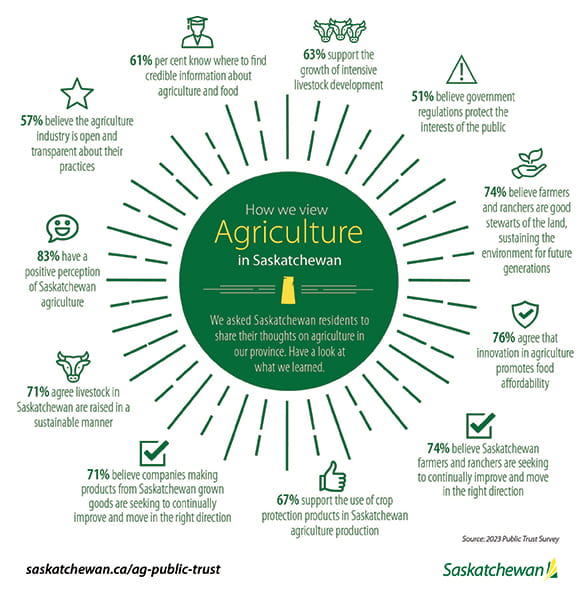By Shankar Das, Public Trust Specialist, Public Trust Unit, Communication Branch, Saskatoon
November 2023
The Ministry of Agriculture has participated in polling for the last 11 years to gain insight into the public’s perception of the agri-food industry. The 2023 Public Trust Survey asked 801 Saskatchewan residents 11 questions to gauge their perception of agriculture in the province. The results showed 83 per cent of residents continued to have a positive perception of agriculture.
The survey showed confidence in several areas, including the responsible use of crop protection products in Saskatchewan (67 per cent) and raising livestock in a sustainable manner (71 per cent).
Seventy-four per cent of respondents said they see farmers and ranchers as good stewards of the land sustaining the environment for future generations, and 76 per cent found innovation in agriculture promotes food affordability.

Two questions were new to this year’s survey, which were rooted in the concept of improvement.
The first question saw almost three-quarters of Saskatchewan residents agree farmers and ranchers are seeking to continually improve and move in the right direction. The second question saw 71 per cent of respondents agree that companies making products from Saskatchewan grown agricultural goods are also seeking to continually improve and move in the right direction.
However, Saskatchewan residents continued to show lower positive perceptions regarding the effectiveness of government regulations and the industry transparently communicating about their practices. The results suggest the importance of better informing consumers about Saskatchewan's robust regulatory framework and encouraging producers to share their stories.
Demographic analysis showed that the residents from the Regina region were more likely to choose ‘Don’t Know’ compared to other regions to nearly 50 per cent of the questions. Additional demographic analysis showed the South region, compared to other regions, was more likely to agree to a number of questions. Residents living in the South region were more likely to know where to find credible information about agriculture and food, agree that the industry is open and transparent, and support intensive livestock development, among other positive responses.
.jpg?h=225&w=300&hash=C1A7FA072C9A45AD40B66AAB352B8C3D)
checking grass quality
Female respondents were more likely to be unsure, compared to male respondents, to the questions around transparency, the use of crop protection products, intensive livestock operations and livestock and sustainability. These findings suggest that there is room for building public trust among women living in Saskatchewan through educational outreach.
When compared to the national polling conducted by the Canadian Centre for Food Integrity, Saskatchewan residents continued to show more acceptance/agreement on a number of agricultural practices such as overall perception of the industry, environmental stewardship and trust in farmers and ranchers.
The results show us we are on the right track. Consider how together, we can continue to build trust in modern agriculture and connect consumers to the food they love.
